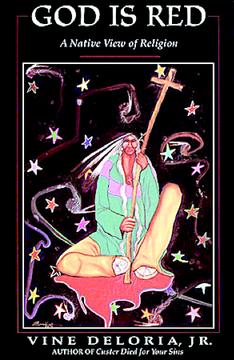It wasn't.
From the first page to the last, the book felt lazy. Deloria apparently didn't do much research before he sat down to write. A cursory glance at the endnotes revealed that he relied largely on newspaper clippings and popular science books to fuel his passionate but dubious argument that evolution is just a provincial Western belief system with no more factual basis than the Judeo-Christian creation story about Adam and Eve.
In short, Deloria seemed out of his element. Yet I have to admit I was excited to learn that his book God is Red was being re-released in a special, updated 30th anniversary edition. Published in the early '70s, God is Red is considered a classic work on religion. In it, Deloria constructs a detailed comparison between Native American spirituality and the Judeo-Christian belief systems. In the process, he illuminates ways in which Christianity has, in his opinion, created an intellectual and cultural environment that endangers the future of our species and the planet itself.
Since Deloria is a Native American expert on Native American religion, you'd think this book would be all it's cracked up to be and more. Mostly, it is. The book certainly reveals some of the more obvious hypocrisies of certain types of Christianity. It also goes a long way toward explaining why Native American beliefs require an intimate connection to the natural world. In this age of poisoned air and water, warming global temperatures, mutant amphibians and rampant species destruction, it makes sense to take many of the Native American spiritual tenets outlined by Deloria to heart.
My biggest problem with the book is that Deloria has a tendency to oversimplify topics to give his arguments greater emotional force. For example, in expressing his hostility toward the dominant civilization that spread from Europe over the past 600 years or so, he pays little attention to differences within Christianity. For Deloria, Christianity is monolithic and almost totally evil. Likewise, according to Deloria, all Christians believe in the literal truth of the Bible. All Christians believe in original sin. And all Christians seem to view the natural with hostility.
After reading God is Red, though, I've come to believe that Deloria should primarily be considered a polemicist. His arguments might sometimes be biased, over-the-top and sloppy, but they are exhilarating to read none the less. In the end, the criticism Deloria aims at Western Civilization is, it must be said, at least partly an accurate one. If we fail to value the earth and to view nature in spiritual terms, we may make short-term material profits, but we will do so at the expense of our existence. It's a very heavy price to pay.









